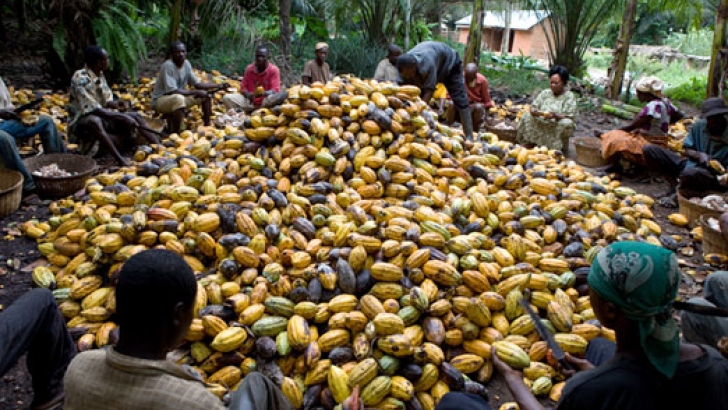The risk of the smallest cocoa harvest in five years is combining with power cuts and a weak oil price to cloud the prospects for Ghana’s debt. Output from the world’s second-biggest producer of the chocolate ingredient may drop 25 per cent from last year, according to Ecobank Transnational Inc.
That’s curbing revenue from the commodity that was the biggest source of Ghana’s foreign exchange in the first quarter. According to Bloomberg Ghana’s Eurobonds lost 1.9 per cent in May, the fourth-biggest retreat after Venezuela, Costa Rica and Gabon among 58 emerging markets.
A drop in cocoa production “adds to the negative backdrop of a depreciating currency, the impact of oil prices on the budget and slowing growth in Ghana,” Kevin Daly, a London-based money manager at Aberdeen Asset Management Plc, who oversees $13 billion in emerging-market debt, said by phone. “A much lower production number is negative for the currency and the budget.”
A fungus outbreak that caused the cocoa shortfall, the worst blackouts in at least eight years, inflation at a four-month high and a currency down 20 percent this year against the dollar are constraining growth in West Africa’s second-biggest economy. The government is forecasting the slowest expansion since 1994 at 3.9 percent this year, while trying to narrow a budget deficit through the help of an International Monetary Fund package signed in April.
Budget Deficit
With cocoa “a major provider of foreign exchange to the government, it’s going to have an impact on how the government services existing Eurobonds,” said Angus Downie, London-based head of economic research at Ecobank. The West African nation’s revenue from exports of cocoa advanced 13 percent to $992.6 million in the first quarter from a year earlier, according to data from Bank of Ghana. Still, that was slower than the 14.5 percent increase recorded in the first quarter of 2014 to $877.9 million, the data showed.
Ghana’s budget deficit is projected by the government to be 7.5 percent of gross domestic product this year compared with 9.3 percent in 2014. On May 13, when the country’s statistics agency said inflation accelerated to 16.8 percent, the Bank of Ghana unexpectedly raised its key lending rate by 1 percentage point to 22 percent, the highest in almost 12 years.
Noah Amenyah, a spokesman for the industry regulator Ghana Cocoa Board, was in a meeting and couldn’t immediately comment when called on Friday. Ghana’s $1 billion of notes due in January 2026 have declined since they were issued in September, pushing yields up 72 basis points to 8.97 percent by 12:22 p.m. in London on Friday. The bonds of Ivory Coast, Ghana’s neighbor and the world’s largest cocoa producer, are moving the other way. Yields on notes due March 2028 fell 21 basis points since their sale in February.
“When you compare and contrast, the potential for stronger growth is more apparent for Ivory Coast than Ghana,” Downie said. “Ghana has been trying to tackle economic problems over the last three to four years.”

